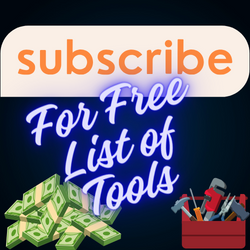Sell Affiliate-Powered Toolkits by Industry
As industries evolve, so do marketing strategies. One innovative approach gaining popularity is the sale of affiliate-powered toolkits, specifically designed for various sectors. These toolkits combine essential tools, resources, and guides to help professionals streamline their operations and enhance productivity. This strategy not only targets niche markets but also generates a consistent income through affiliate commissions. Let’s explore how to effectively create and market these toolkits across different industries.
1. Understanding Your Audience
Before you can sell anything, it’s crucial to know who you’re selling to. Consider these steps:
- Research demographics: Understand age, job roles, and pain points.
- Gather feedback: Conduct surveys or interviews to gauge what professionals in the industry truly need.
- Analyze competitors: Look into existing toolkits and identify gaps you can fill.
By understanding your audience, you can create toolkits that resonate with their specific needs, making your offerings more appealing and effective.
2. Creating Valuable Content
Each toolkit should contain high-quality content that adds real value. Here’s how to ensure your content shines:
- Curate resources: Include guides, templates, and checklists that are easy to use.
- Include tutorials: Video or written tutorials can further enhance user experience.
- Stay updated: Regularly refresh your content to keep it relevant and useful.
Content that provides genuine solutions will not only attract buyers but also encourage them to return for future purchases.
3. Choosing the Right Affiliate Programs
Not all affiliate programs are created equal. To maximize your toolkit’s potential:
- Evaluate commission structures: Look for programs that offer competitive rates.
- Check product quality: Only partner with reputable companies that provide high-quality tools.
- Assess support: Ensure the affiliate program offers good support and resources for its affiliates.
Aligning with the right affiliates can enhance the credibility and effectiveness of your toolkits.
4. Industry-Specific Toolkit Ideas
Consider the unique needs of various industries when developing your toolkits. Here are some specific ideas:
- Health and Wellness: Include fitness trackers, meal planning guides, and wellness apps.
- Real Estate: Offer tools for property management, marketing templates, and CRM software.
- Marketing Professionals: Create a toolkit with SEO tools, social media schedulers, and analytics software.
Tailoring your offerings to specific industries will help you stand out and attract targeted customers.
5. Building an Effective Landing Page
Your landing page is often the first impression potential customers will have of your toolkit. To make it count:
- Use a compelling headline: Grab attention with a clear and enticing headline.
- Highlight benefits: Clearly outline how your toolkit will solve problems or improve workflows.
- Add testimonials: Showcase positive feedback from previous customers to build trust.
Invest time in crafting a landing page that not only informs but also converts visitors into buyers.
6. Marketing Your Toolkits
Once your toolkits are ready, it’s time to get the word out. Here are effective marketing strategies:
- Social Media: Utilize platforms like LinkedIn, Facebook, and Instagram to share insights and promote your toolkits.
- Email Campaigns: Create targeted email campaigns that highlight the benefits of your toolkits.
- Content Marketing: Write blog posts or create videos that provide value and subtly promote your toolkits.
Consistent and strategic marketing efforts will help you reach your target audience and increase sales.
7. Leveraging SEO for Visibility
To enhance your toolkit’s visibility online, you need to incorporate SEO best practices:
- Keyword Research: Identify keywords relevant to your industry and incorporate them into your content.
- Optimize Meta Tags: Ensure that your titles and descriptions are engaging and keyword-rich.
- Use Internal Linking: Link to related blog posts or resources within your site to improve navigation and SEO.
Effective SEO strategies can significantly increase organic traffic to your toolkit landing pages.
8. Tracking Performance and Gathering Feedback
Monitoring your toolkit’s performance is essential for ongoing success:
- Use Analytics Tools: Track sales, clicks, and conversion rates to assess performance.
- Gather Customer Feedback: Solicit feedback to understand what works and what needs improvement.
- Adjust Strategies: Use insights to refine your marketing strategies and toolkit offerings.
Regularly reviewing performance will help you make informed decisions and improve your toolkits over time.
9. Scaling Your Toolkit Business
Once your initial toolkits are successful, consider scaling your business:
- Expand to New Industries: Explore additional markets where your toolkit model can be applied.
- Collaborate with Influencers: Partner with industry influencers to reach a broader audience.
- Offer Subscription Models: Consider creating subscription-based toolkits for ongoing revenue.
Scaling can help you tap into new revenue streams and grow your business sustainably.
Crafting and selling affiliate-powered toolkits tailored to specific industries not only meets the needs of professionals but also creates opportunities for consistent income. By focusing on value, effective marketing, and quality partnerships, you can build a successful toolkit business that resonates with your audience. With careful planning and execution, your toolkits can become essential resources in their respective fields.










Leave a Reply